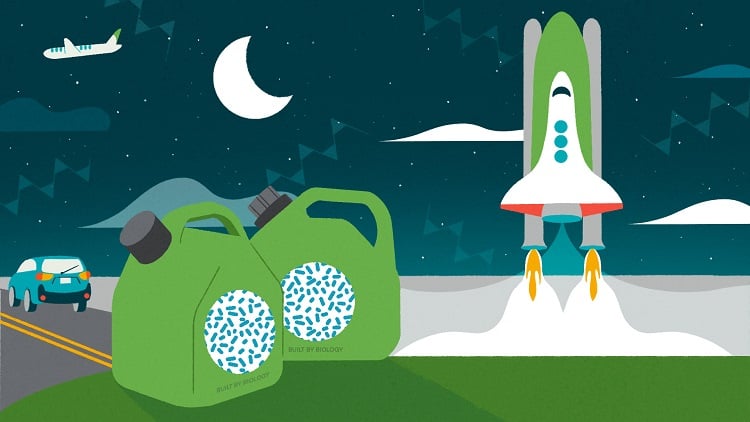S. Himmelstein | July 14, 2022
 A new type of biofuel that could power all types of vehicles, including rockets. Source: Jenny Nuss/U.S. Lawrence Berkeley National Laboratory
A new type of biofuel that could power all types of vehicles, including rockets. Source: Jenny Nuss/U.S. Lawrence Berkeley National Laboratory
An energy-dense biofuel produced with some help from Streptomyces bacteria could offer an environmentally sustainable alternative to heavy duty fuels, including rocket fuel.
The fuel is based on biologically produced polycylcopropanated molecules containing multiple triangle-shaped three-carbon rings that force each carbon-carbon bond into a sharp 60° angle. The potential energy in this strained bond translates into more energy for combustion than can be achieved with the larger ring structures or carbon-carbon chains typically found in fuels. These structures also enable fuel molecules to pack tightly together in a small volume, increasing the mass and total energy of fuel in any given storage space.
An international group of researchers identified the Streptomyces cyclopropane-producing bacteria and copied the associated gene clusters into other bacteria that are easier to manage in the laboratory environment. The polycyclopropanated fatty acid methyl esters produced, labeled fuelimycins, require only one additional chemical processing step to yield a ready-to-burn fuel.
Computer simulations conducted to compare biofuel and conventional fuel properties indicated that the new fuels would be safe and stable at room temperature and would deliver an energy density of over 50 megajoules per liter (MJ/l). This surpasses values for more common fuels, including the 32 MJ/l of gasoline and 35 MJ/l of common jet and rocket fuels.
The elevated energy density could enable vehicles to travel farther on a single tank or reduce the amount of fuel needed for rocket launches, saving more space and weight for cargo while cutting overall emissions.
The research conducted by scientists from U.S. Lawrence Berkeley National Laboratory, University of California Berkeley, U.S. Sandia National Laboratories, U.S. Pacific Northwest National Laboratory, Shenzhen Institutes for Advanced Technologies (China) and Technical University Denmark is published in the journal Joule.
